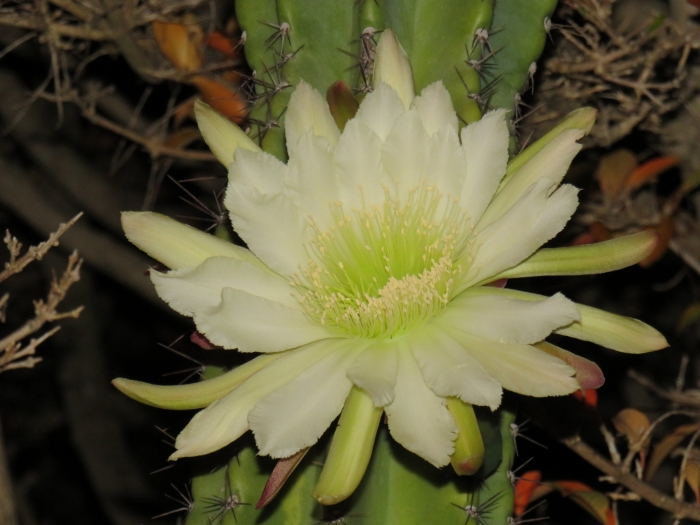Mandacaru
(Cereus jamacaru)
Mandacaru (Cereus jamacaru)
/
/

© Jeremy Gilmore
CC BY 4.0
Image By:
© Jeremy Gilmore
Recorded By:
Copyright:
CC BY 4.0
Copyright Notice:
Photo by: © Jeremy Gilmore | License Type: CC BY 4.0 | License URL: http://creativecommons.org/licenses/by/4.0/ | Uploader: jeremygilmore | Publisher: iNaturalist |
























Estimated Native Range
Summary
Cereus jamacaru, commonly known as Mandacaru, is a cactus native to the Caatinga and Cerrado biomes of central and eastern Brazil. This species can reach up to 20 feet in height and is characterized by its segmented, columnar stems that bear large crowns. Mandacaru blooms with large, white, night-blooming flowers that are highly fragrant, attracting pollinators such as bats and moths. After flowering, it produces edible fruits that turn red when ripe, providing a food source for local wildlife and humans alike.
Mandacaru is valued for its striking architectural form and is often used as an ornamental plant in xeriscaping due to its low water requirements and high tolerance for drought. It thrives in well-draining soils and prefers full sun exposure. While it is relatively low-maintenance, it can be susceptible to root rot if overwatered. In cultivation, it is important to be cautious of its potential invasiveness, as it can spread aggressively outside its native range. Gardeners should consult local regulations before planting to prevent ecological disruptions.CC BY-SA 4.0
Mandacaru is valued for its striking architectural form and is often used as an ornamental plant in xeriscaping due to its low water requirements and high tolerance for drought. It thrives in well-draining soils and prefers full sun exposure. While it is relatively low-maintenance, it can be susceptible to root rot if overwatered. In cultivation, it is important to be cautious of its potential invasiveness, as it can spread aggressively outside its native range. Gardeners should consult local regulations before planting to prevent ecological disruptions.CC BY-SA 4.0
Plant Description
- Plant Type: Shrub, Tree
- Height: 15-30 feet
- Width: 3-6 feet
- Growth Rate: Rapid
- Flower Color: White
- Flowering Season: Summer, Fall
- Leaf Retention: Deciduous
Growth Requirements
- Sun: Full Sun
- Water: Low, Medium
- Drainage: Fast
Common Uses
Drought Tolerant, Edible*Disclaimer: Easyscape's listed plant edibility is for informational use. Always verify the safety and proper identification of any plant before consumption., Low Maintenance, Showy Flowers
Natural Habitat
Native to the Caatinga and Cerrado biomes of central and eastern Brazil
Other Names
Common Names: Mandacaru, Peruvian Apple Cactus
Scientific Names: , Cereus jamacaru, Cereus cauchinii, Cereus perrottetianus,
GBIF Accepted Name: